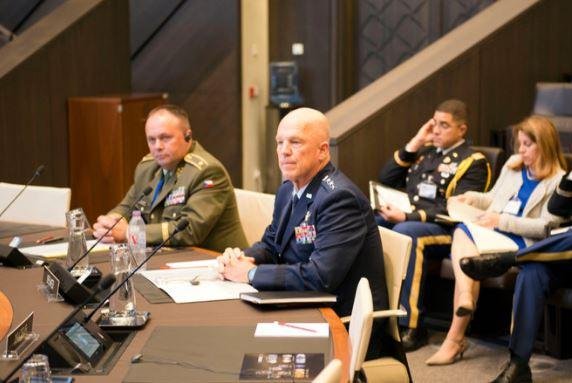U.S. Air Force Lt. Gen. Scott Kindsvater (C) addressed the NATO Military Committee in Brussels on Monday, calling for vigilance in space. Photo courtesy of NATO
Oct. 14 (UPI) -- The NATO Military Committee's meeting in Brussels on Monday called for a commitment to defense and deterrence in space.
U.S. Air Force Lt. Gen. Scott Kindsvater, deputy chairman of the committee, on Monday at a NATO Military Committee meeting cited the NATO's overarching space policy, approved by ministers in June, as vital to the alliance accomplishing its mission.
"Defense ministers agreed NATO's first-ever space policy," Kindsvater said. "They recognized that space is part of our daily lives, and while it can be used for peaceful purposes, it can also be used for aggression. Satellites can be hacked, jammed, or weaponized. Anti-satellite weapons could cripple communications. It is therefore important that we are vigilant and resilient, also in space."
While several NATO countries are organizing internal efforts to build independent military missions in space, NATO's policy calls on the bloc to "play an important role as a forum to share information, increase interoperability, and ensure that our missions and operations can call on the support they need," NATO Secretary General Jens Stoltenberg said in June.
On Monday, Gen. John Raymond of the newly re-established U.S. Space Command told the Brussels delegates that "Space has become a vital domain that is critical to the nation's security and economy and is no longer a benign environment."
"Though this command we will get better space intelligence by working more closely with foreign allies, with the US intelligence community and with commercial companies," Raymond said. "Our goal is to deter conflict but we need to be ready if deterrence fails."
NATO's hands-off policy on space largely is influenced largely by a report of the Joint Air Power Competence Center, a military advisory group comprised of 16 member nations acting as providers of solutions on air and space challenges.
The group has noted that NATO does not own satellites and has no policies "for air, land and sea -- excepting the recent Alliance Maritime Strategy -- yet continues to demonstrate competence in these domains. No adversary has challenged NATO's use of space for operations." Consequently, it says, there is little need to currently codify NATO's relationship to space except for members to support each other's space missions.















